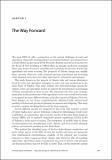The Way Forward
Author(s)
Yu, Winston; Yang, Yi-Chen; Savitsky, Andre; Alford, Donald; Brown, Casey; Wescoat, James; Debowicz, Dario; Robinson, Sherman; ... Show more Show less
DownloadWescoat_The way forward.pdf (604.1Kb)
PUBLISHER_CC
Publisher with Creative Commons License
Creative Commons Attribution
Terms of use
Metadata
Show full item recordAbstract
Draws together findings from the chain of analyses on Pakistan's Indus Basin, distinguishing between the relative significance of different scenarios, impacts, and adaptations, and highlighting recommendations for research, planning, and policies that can help expand the range of options for Indus Basin management. Key findings include: (1)The 1991 Provincial Water Allocation Accord (DIVACRD) remains a critical hydrologic constraint; (2) Future climate risks will likely impact the macro-economy and households; (3) Non-farm household incomes will suffer more due to increased crop prices; (4) An increase in basin-wide storage will increase the hydropower generation and minimize the impacts of extreme events; (5) Different adaptation investments show potential to minimize the impacts of future climate risks and meet food security objectives; (6) Climate change will likely impact future food availability nationwide; and (7) Groundwater depletion in the fresh water area and basin-wide salinity issues will grow worse with no policy intervention.
Date issued
2013-04Department
Massachusetts Institute of Technology. Department of ArchitectureJournal
The Indus Basin of Pakistan: The Impacts of Climate Risks on Water and Agriculture
Publisher
The World Bank
Citation
Yu, Winston, Yi-Chen Yang, Andre Savitsky, Donald Alford, Casey Brown, James Wescoat, Dario Debowicz, and Sherman Robinson. “The Way Forward.” The Impacts of Climate Risks on Water and Agriculture (April 18, 2013): 145–149. © International Bank for Reconstruction and Development/The World Bank
Version: Final published version
ISBN
978-0-8213-9874-6
978-0-8213-9875-3